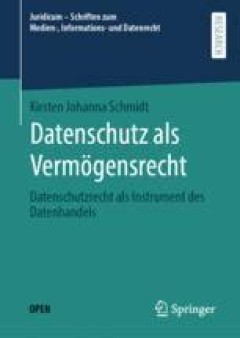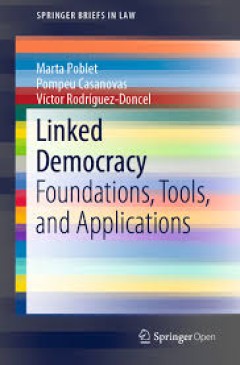Filter by

Governance and Control of Data and Digital Economy in the European Single Mar…
In an era where the digital realm is evolving at an unprecedented pace, the legal framework must adapt accordingly to ensure effective governance and control. This open access book explores the intricate web of regulations governing new digital assets, identities, and data spaces within the European Single Market. Through a comprehensive exploration of emerging concepts, it provides clarity ami…
- Edition
- 1
- ISBN/ISSN
- 978-3-031-74889-9
- Collation
- VII, 515
- Series Title
- -
- Call Number
- -

Datenschutz als Vermögensrecht = Datenschutzrecht als Instrument des Datenha…
In diesem Open-Access-Buch untersucht die Autorin die Fortentwicklung des Datenschutzrechts zu einem Datenhandelsrecht. Sie stellt dar, wie Personendaten bereits heute gehandelt werden können und wo sich Problemfelder insbesondere vor dem Hintergrund von Big Data ergeben. Außerdem veranschaulicht sie bestehende Reformvorschläge, wie z. B. die Einführung eines sogenannten „Dateneigentums�…
- Edition
- 1
- ISBN/ISSN
- 9783658307974
- Collation
- XXI, 228 ill; lamp
- Series Title
- -
- Call Number
- -

Business Data Ethics : Emerging Models for Governing AI and Advanced Analytics
This open access book explains how leading business organizations attempt to achieve the responsible and ethical use of artificial intelligence (AI) and other advanced information technologies. These technologies can produce tremendous insights and benefits. But they can also invade privacy, perpetuate bias, and otherwise injure people and society. To use these technologies successfully, organi…
- Edition
- -
- ISBN/ISSN
- 978-3-031-21491-2
- Collation
- XVII, 101
- Series Title
- SpringerBriefs in Law (BRIEFSLAW)
- Call Number
- -

Linked Democracy : Foundations, Tools, and Applications
This open access book shows the factors linking information flow, social intelligence, rights management and modelling with epistemic democracy, offering licensed linked data along with information about the rights involved. This model of democracy for the web of data brings new challenges for the social organisation of knowledge, collective innovation, and the coordination of actions. Licensed…
- Edition
- -
- ISBN/ISSN
- 978-3-030-13363-4
- Collation
- XV, 130
- Series Title
- SpringerBriefs in Law (BRIEFSLAW)
- Call Number
- -

Multidisciplinary Perspectives on Artificial Intelligence and the Law
This open access book presents an interdisciplinary, multi-authored, edited collection of chapters on Artificial Intelligence (‘AI’) and the Law. AI technology has come to play a central role in the modern data economy. Through a combination of increased computing power, the growing availability of data and the advancement of algorithms, AI has now become an umbrella term for some of the mo…
- Edition
- -
- ISBN/ISSN
- 978-3-031-41264-6
- Collation
- XV, 456
- Series Title
- Law, Governance and Technology Series (LGTS, volume 58)
- Call Number
- 340 MUL

Beyond Data : Human Rights, Ethical and Social Impact Assessment in AI
This open access book focuses on the impact of Artificial Intelligence (AI) on individuals and society from a legal perspective, providing a comprehensive risk-based methodological framework to address it. Building on the limitations of data protection in dealing with the challenges of AI, the author proposes an integrated approach to risk assessment that focuses on human rights and encompasses…
- Edition
- -
- ISBN/ISSN
- 978-94-6265-531-7
- Collation
- XXIII, 200
- Series Title
- Information Technology and Law Series
- Call Number
- 001 MAN b

Multi-dimensional Approaches Towards New Technology
This open access edited book captures the complexities and conflicts arising at the interface of intellectual property rights (IPR) and competition law. To do so, it discusses four specific themes: (a) policies governing functioning of standard setting organizations (SSOs), transparency and incentivising future innovation; (b) issue of royalties for standard essential patents (SEPs) and related…
- Edition
- 1
- ISBN/ISSN
- 9789811312311
- Collation
- XXV, 337 hlm,: ill, lamp;
- Series Title
- -
- Call Number
- -

Beyond Data
This open access book focuses on the impact of Artificial Intelligence (AI) on individuals and society from a legal perspective, providing a comprehensive risk-based methodological framework to address it. Building on the limitations of data protection in dealing with the challenges of AI, the author proposes an integrated approach to risk assessment that focuses on human rights and encompasses…
- Edition
- 1
- ISBN/ISSN
- 978-94-6265-531-7
- Collation
- -
- Series Title
- Information Technology and Law Series
- Call Number
- XXIII, 200

Selbstbestimmung, Privatheit und Datenschutz
In diesem Open-Access-Sammelband werden die aktuelle Herausforderungen für Privatheit und Datenschutz aufgezeigt, die durch die zunehmende Digitalisierung entstehen. Die Beitragsautoren analysieren, wie diese durch Governancemechanismen adressiert werden können. Als Alternative zu einem rein profitorientierten Digitalkapitalismus bzw. Digitalautoritarismus wird für einen eigenständigen euro…
- Edition
- 1
- ISBN/ISSN
- -
- Collation
- -
- Series Title
- DuD-Fachbeiträge
- Call Number
- XXIX, 508

Locating Legal Certainty in Patent Licensing
This open access book presents global perspectives and developments within the information and communication technology (ICT) sector, and discusses the bearing they have on policy initiatives that are relevant to the larger digital technology and communications industry. Drawing on key developments in India, the USA, UK, EU, and China, it explores whether key jurisdictions need to adopt a diffe…
- Edition
- 1
- ISBN/ISSN
- 978-981-15-0181-4
- Collation
- -
- Series Title
- -
- Call Number
- XIV, 138
 Computer Science, Information & General Works
Computer Science, Information & General Works  Philosophy & Psychology
Philosophy & Psychology  Religion
Religion  Social Sciences
Social Sciences  Language
Language  Pure Science
Pure Science  Applied Sciences
Applied Sciences  Art & Recreation
Art & Recreation  Literature
Literature  History & Geography
History & Geography